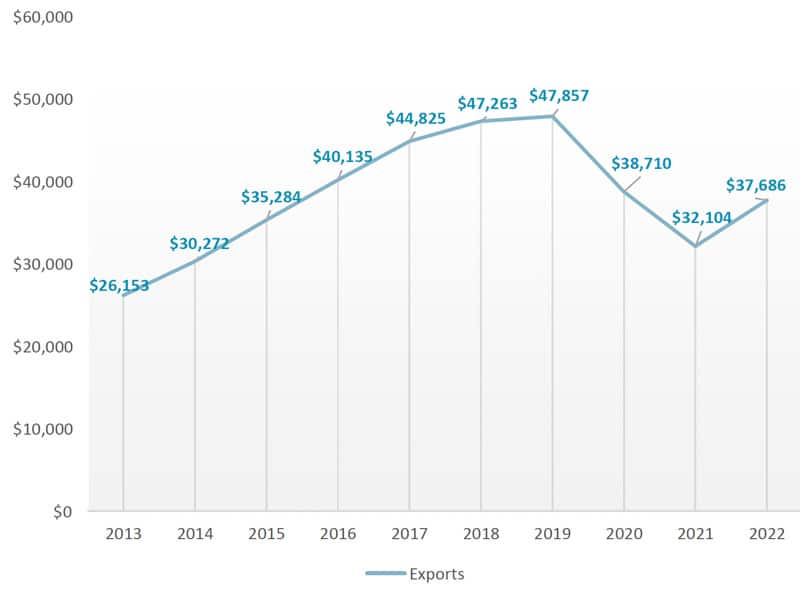US: Federal government announces increased focus on boosting education exports
- The US Department of Commerce announced this week that international education will be included as a priority sector in the forthcoming update to the US national export strategy
- This will translate into increased engagement with the sector across the US government, and especially in lead agencies such as the Department of Commerce, Department of Education, Department of State, and Department of Homeland Security
- The US Bureau of Economic Analysis, meanwhile, reports that education exports rose more than 17% in 2022 to reach nearly US$38 billion
"The United States will be a better and a stronger partner to the world if it has a national strategy that allows American students to go in larger numbers overseas to really learn, explore, and engage with the world," said NAFSA Chief Executive, Fanta Aw, in conversation with The Chronicle of Higher Education's Karin Fischer. "In the same way, it would be in our best interest to have international students who study, who research, who work, who thrive here and who take that knowledge back. We’ve got to have a concerted effort and a consistent message about welcoming international students. It is everything from our visa process to the pathways post-graduation. For any student who has promise, who wishes to come and study in the United States, we must make that easier for them to do so."
Speaking at the NAFSA 2023 annual conference in Washington, D.C. this week, Kendee Yamaguchi, the Deputy Assistant Secretary for the International Trade Administration, announced an important additional step in the US government's engagement with the sector. "International education has been included as a priority sector in the forthcoming national export strategy (NES)," she explained. "This is the first time that the NES will feature international education."
The NES essentially outlines the priorities for export development for agencies across the federal government. The sector's inclusion in the forthcoming update of the NES means in effect that a number of federal departments can now be expected to deepen their collaborations in and around international education in the US.
Ms Yamaguchi went on to outline several key themes in the forthcoming strategy, including:
- Connecting US educational institutions and consortia with foreign groups interested in US education;
- Promoting the United States as a premier study destination;
- Highlighting the importance of education as a US export; and
- Leveraging federal resources to identify and promote global opportunities to the US education industry.
While plans are still developing, it seems that the new strategy will translate into expanded trade promotion (at events and otherwise) on behalf of US education as well as expanded advocacy (on the part of lead government agencies) for the sector at home and abroad.
The stakes are high in that education has emerged as a substantial export sector within the US economy. As we see in the chart below, the economic impact of education exports in the US is trending toward pre-COVID levels after a 17%+ year-over-year increase in 2022 and an estimated value of nearly US$38 billion for that year.

Part of what the NES announcement reveals is that there are several federal agencies in the US that may play a part in a more cohesive strategy, including the Department of Commerce (export promotion), Department of Education (global competency and educational exchange), Department of State (diplomacy and foreign relations), and Department of Homeland Security (visa processes and policy).
Also speaking at the conference, Maureen McLaughlin, Senior Adviser to the Secretary and Director of International Affairs for the Department of Education, said that, "We want students to come [to the US]; we want our students to be globally competent; and we want our schools to be internationalised."
She pointed as well to the March 2022 update to US Department of Education's international education strategy, "Succeeding Globally Through International Education and Engagement", with its key themes of advancing diversity, global competency, and diplomacy.
The key signal for the expanding focus on the sector by these various federal departments was the July 2021 joint statement by the US Department of Education and Department of State expressing a “renewed focus on international education” on the part of the federal government. Ms McLaughlin characterised that joint statement as, "The first statement at this level and of this kind in more than 20 years."
The joint statement led in turn to a December 2021 call for a more deliberate national strategy for international education on the part of a number of peak bodies in the US, including The American Association of Community Colleges, American Association of State Colleges and Universities, American Council on Education, Association of American Universities, Association of Public and Land-grant Universities, Institute of International Education, NAFSA, and the National Association of Independent Colleges and Universities. Those bodies have been very clear in their expectation that the federal government should be a convenor of a much wider discussion with stakeholders across US education toward a more comprehensive national strategy.
For additional background, please see:


















